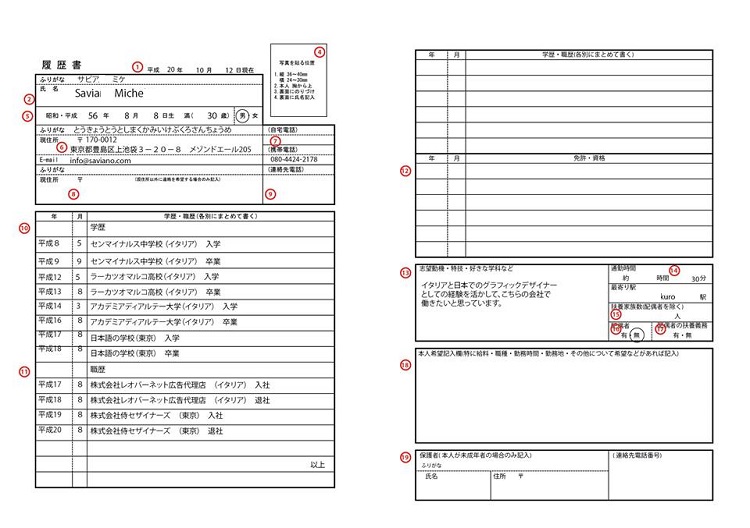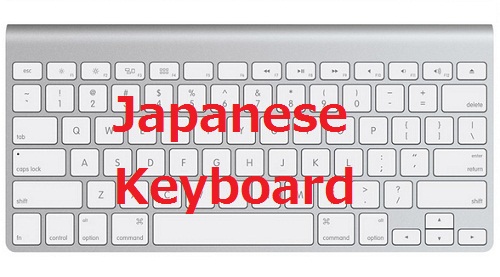Writing CV in Japanese
Contents
 Writing CV in Japanese
Writing CV in Japanese
Curriculum Vitae (CV) in Japanese is 履歴書 (Rirekisho), it is one of the most important component of the Job Application Portfolio. When writing CV in Japanese, the CV have to fully display the most basic information about you such as:
- Who you are.
- Your academic background and employment history.
- Your qualities and skills.
Then your potential employer can preliminarily consider if you are suitable for the position. Therefore, writing a good CV is one of the things candidates are most concerned about.
In this article, Web will introduce you to some Japanese vocabulary used in writing CV in Japanese.
You can download CV samples here: Japanese CV samples

To make a good first impression, you need to have your CV systematically and clearly analyzed. Keep it short and straight to the point. A Japanese CV normally includes:
General information
入日(Kinyū-bi – Date (when the CV is written))…..日現在 (Nichigenzai- – Current date).
For example:
- 2015年12月15日現在
- 氏 名(Shimei): Your full name in Romaji. The section ふりがな is Kana pronunciation of Kanji.
- 生年月日(Seinengappi) or sometimes 誕生日(Tanjōbi): Date of birth
There are two dating systems in Japan:
- Western calendar.
- Years are numbered within eras and named by the reigning Emperor.
For example: If you were born before 1989, then that is the 昭和 (Showa) era, from 1989 until now is the 平成 (Heisei) era.
- 平成24年6月15日 June 16th Heisei 27 (Jun 16th 2012).
- 昭和56 8月3日 August 3rd Showa 56 (August 3rd 1981).
- Circle 男(otoko – male) or 女(onna – female)
- 写真(Shashin): Portrait.
- 国籍(Kokuseki): Nationality.
- 現 住所 (Genjūsho): Current residential address, it should be written in your mother tongue to have the letter delivered at the right address.
- 連絡先(Renrakusen): Contact information, name of the contact person, preferably your name (in Romaji).
- 電話(denwa) or 電話番号(Tenwabangō): Phone number.
- メールアドレス(Mēruadoresu): Email address.
Note: Where named ふりがな (furigana – pronunciation), you can write or skip it.
Normally, CV samples used for job applications consist of details about your work experience and work progress that you have garnered. It is called 職務経歴書 (Shokumu keirekisho). The more detailed you write on your CV, the higher chance for you to make your potential employer impressed.
学歴 (Gakureki ): Academic background
Your academic background with the names of schools and point of time. Your highest level of education should be shown first to impress the recruiters.
For example:
1991-1995年/シアトル大学 từ 1991 – 1995 : The University of Seattle
Some vocabulary when writing CV in Japanese :
小学校 (Shōgakkō) Elementary school.
中学校 (Chūgakkō) Secondary school.
高等学校 (Kōtō gakkō) High school.
大学 (Daigaku) University.
学部 (Gakubu) Faculty.
学士 (Gakushi) Bachelor.
Actually, you only need to write down your Bachelor’s and Master’s degrees. In case you don’t have one, then start from the elementary school.
For example:
経営学士 (Keiei gakushi): Bachelor of Business and Administration.
Some vocabulary in Japanese to describe faculties and names of university :
経済 (Keizai): Economics.
外国語 (Gaikoku-go): Foreign languages.
国際関係 (Kokusai kankei): International Relations.
法(Hō): Law.
工(Kō): Techology.
職歴(Shokureki): Employment history
….年-現在: From (year) …. until now
Fill in information such as: Names of companies that you have worked for, positions or job descriptions.
For example:
・・・・で働いた経験があります. De hataraita keiken ga arimasu.
Have experience working in….
・・・・でのインターンシップを行いました. De no intānshippu o okonaimashita.
Have taken part in internships for…..
・・・・でのボランティア活動を行い増ました. De no borantia katsudō o okonai zōmashita.
Have taken part in volunteer activities at…
役職名(Yakushokumei): Position.
部署名(Bushomei): Department.
You can also draw a table with a date column like the above figure. In this part, you only have to write down the names of companies in Japanese like the above sample.
On reasons why you quit the previous jobs, you can reason out like this: リストラ(risutora – company restructured) or 契約満了により退社 (Keiyaku manryō ni yori taisha – leave compay due to end of contract).
Avoid giving reasons like: 解雇(kaiko – fired) which will ruin your reputation. To avoid digging into the topic, answer it nonspecifically such as: 一身上の都合により退社(Isshinjō no tsugō ni yori taisha – quit because of personal reasons).
You don’t have to show the reasons why you quit on your CV, they will ask in the interview, you should prepare an answer. (Check out: Frequently asked questions in interviews)
免許-資格(Menkyo – shikaku): Degrees and Certificates
List out all the degrees and certificates that you have achieved. If working in Japan, a very important thing is 日本語能力試験(Nihon gonōryokushiken – JLPT) – Your Japanese level as JLPT N2, JLPT N3… In addition, you need to add your professional degrees and other certificates. Driving License is normally written first (car driving license) because it’s very important in Japan.
特技(Tokugi): Special Skills
- … の読解と会話両方に秀でています. (No dokkai to kaiwa ryōhō ni hīdete imasu): Fluent in <languages>, even you don’t have a certificate.
- パソコンを使いこなせます(Pasokon o tsukaikonasemasu): very good at Computer skills.
For example:
- 高度なマイクロソフトオフィスの技術 (Kōdona Maikurosofuto ofisu no gijutsu): Proficient in Microsoft Office.
- マ イクロソフトワード/エクセル/アクセス/パワーポイントの知識 (Maikurosofutowādo, ekuseru, akusesu, pawāpointo no chishiki): Proficient in Microsoft Word, Excel, Acess, Power Point.
- 優れたコミュニケーション力 (Sugureta komyunikēshon-ryoku): Excellent communication skills.
- プレゼンテーション能力(Purezentēshon nōryoku): Excellent presentation skills.
- 交渉能力 (Kōshō nōryoku): Excellent negotiation skills.
If you’re not that “Excellent” then you can replace it with “able to” – できる
- 本人希望記入欄(Honnin kibō kinyū ran): Expectations
- 勤務部署(Kinmu busho): Department.
- 勤務地 (Kinmuchi): Work place (In case some companies have many branches).
- 給 与(Kyūyo): Salary expectation (In case you are confident in your abilities and skills, you can write 年収 + Number +万円以上であればと思っております(Nenshū ….man-en ijōdeareba to omotte orimasu – I expect an annual income of…. (ten thousands) yen (man) or more).
If you want to discuss about salary in person, use ご相談させて頂きたいと思っております (Go sōdan sa sete itadakitai to omotte orimasu) which means the salary can be negotiated. You shouldn’t mention about salary if the recruiter doesn’t request you to.
You can skip other expectations if there is not any.
Others
When looking for samples when writing CV in Japanese, you might also see:
- 配偶者の有無 (Haigūsha no umu): Marital status.
You can fill in or mark the given options (in printed CV) for example: 独身 (Dokushin – Single), 既婚 (Kikon – Married). Sometimes there is 配偶者 (Spouse) option, then you have to circle 有(Yū – Yes) và 無(mu – No).
- 配 偶者の扶養義務 (Haigūsha no fuyō gimu): Financial dependents, choose 有 (yes) or 無 (no). If yes, then fill in 扶養家族数 (Fuyō kazokusū – Number of people) above.
- 通勤時間 (Tsūkin jikan) : Commuting time (estimated time travelling from home to work).賞罰(Shōbatsu – Reward and punishment)
- 志望の動機 (Shibō nó dōkì – Reasons why you applied)
- 保 護者(Hogosha – Guarantors and References) along with contact information. Keep it precise and concise, you will be highly appreciated.
You can also add section 趣味 (shumi – Hobbies) or 好きな学科(Sukina gakka – Concerned topics) to make it more diverse.
Above are some basic knowledge on writing CV in Japanese. Hope this will help you write the best CV and impress your potential employers.
Feel free to contribute to the topic, your feedback is highly appreciated!


